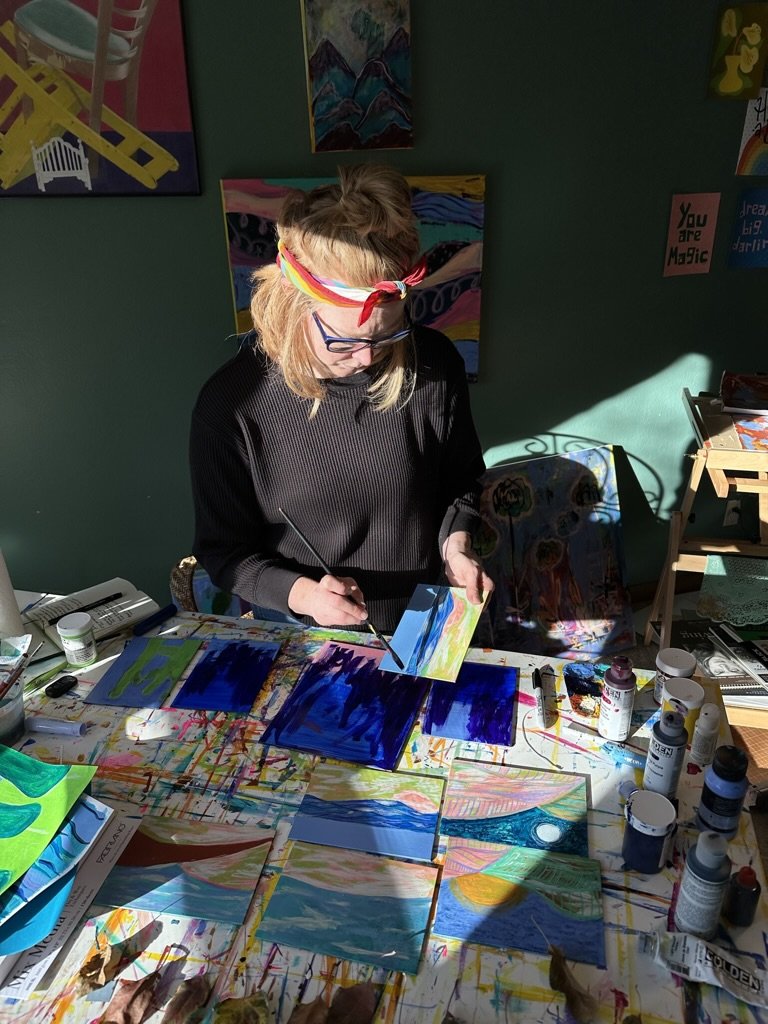My 6 Core Values as a Helping Professional and Human
To me, creating a heart-centered business that supports other humans in flourishing means being very intentional about aligning what I’m putting into the world with my values.
That is especially true because some of my clients have experiences where their values and priorities were not honored by specific providers or the healthcare system at large.
In sharing my own values, I hope you get to know me a bit better and perhaps gain a deeper understanding of the “why” behind my work. But I also invite you to take this opportunity to reflect on your own values. Especially if you are in a season of seeking support of any kind, it’s so important to feel a sense of alignment with whomever you’re asking for help.
1. Authenticity
It matters a lot to me that my actions align with my deeply-held values, including advocating for what is right and helping people flourish. I really appreciate the relationships and spaces that allow me to show up just as I am — and this is what I hope to create in each 1-to-1 session and group I host.
You are allowed to be right where you are, feeling all the things you’re feeling. You don’t need to pretend, perform, or wrestle yourself into having a different experience. You are allowed to be a messy, beautiful human!
It’s easy to get sucked into larger cultural values (e.g., productivity, efficiency, independence — basically anything that helps the capitalist machine keep chugging along). I love witnessing clients be honest and clarify their own truths, values, and priorities.
The relief of letting go of others’ expectations and living authentically can be palpable! Sometimes I can even see the shoulders fall away from ears, brow unfurrowing, and a contented deep sigh out.
2. Self-compassion
Being a human is hard. As poet Nayyirrah Waheed writes,
“be easy.
take your time.
you are coming home to yourself.”
You don’t have to have it all figured out — none of us do. I think the important question is: How can you stay present to your experience with kindness?
Self-compassion is an inner commitment to caring for yourself as you would a friend, especially in times of challenge, stress, and overwhelm. And experiencing a loving, connected presence is key to navigating life with chronic health conditions.
Given that one of the 3 elements of self-compassion is common humanity, it makes sense that we can’t deepen self-compassion simply through refining our self-talk.
By practicing compassionate presence with others in their struggles and receiving kindness and grace in ours, we begin turning this kind of friendship inwards. Which leads me to my next value…
3. Connection
We are not made to go it alone. We need each other. And the journey is much more manageable (and even joyful!) when we have others to encourage us and celebrate the wins with, no matter how big or small.
From the struggles of daily life to the big losses, I can confidently say that the people in my life have made a huge difference. They have been my cheerleaders. They have shown up with baked goods. They have held hope for me when I couldn’t see the good through the pain.
I love intentionally bringing people together and seeing the magic that can happen. This is one of the reasons I’m committed to group offerings like Root to Rise in addition to my 1-to-1 work.
4. Rest
As a recovering perfectionist, I am an eternal student of what I teach: Your worth is not defined by your productivity.
This might not sound revolutionary at first, but consider all the systems that operate on ableist, life-draining standards. As writer, teacher, and advocate Rebekah Taussig articulates,
“The more you do, the more hours of overtime you work, the less sleep you get, the more duties you fulfill, the faster you get the work done, the less help you require, the more you’re worth.” (p. 126, Sitting Pretty)
Honestly, it’s in the air we breathe. I certainly saw it everywhere when I worked in the hospital, in clinics — supposed places of healing.
So now it is my great joy to help us all find a slower pace and a kinder way of being.
For clients who struggle with fatigue and energy-limiting conditions, energy conservation and intentional rest are foundational parts of our work together. (First, we have to debunk the Myth of Infinite Capacity, which I write about here.)
My favorite thing is when somebody tells me they heard my voice saying, “It’s okay to slow down, to listen to your body and rest.”
One of my best friends and I often encourage each other to “Be less, do less.” No hustle, grind or bootcamp vibes here!
5. Creativity
I think creativity is a way of life (and it’s not just for artists). Thinking and moving outside the box can bring new insights, which is why I love integrating many different approaches and modalities.
I taught a Dance for Parkinson’s class for nearly 8 years, beginning in the first year of my Master’s in Occupational Therapy program.
Amongst the many benefits, exploring creative movement equipped participants for life outside the studio because they practiced finding different ways of moving, thinking about things, and improvising.
And what is life navigating chronic/complex/confusing health issues if not an improvisational dance?
It’s not about finding all the right answers (those don’t really exist). It’s about learning the tools; giving yourself ample time & space; adjusting expectations & your approach; and continuing to participate in the creative process.
6. Balance
To me, balance looks like having time and energy for the activities and people that matter most to me. (It also means sometimes having a big quinoa kale salad followed by a big scoop of cookie dough ice cream!)
I think it’s important to honor the different seasons of our lives, where we might need to adjust our focus to certain areas and away from others.
Balance is dynamic. Think about walking on one floor of your house — now, consider walking on a tightrope strung between two buildings. Technically your balance skills haven’t changed, but the second situation probably feels a lot more tenuous!
When the contexts of our lives or our resources change, we are invited (or sometimes thrust) into reassessing and recalibrating. What does balance look like for me right now? What do I need to embrace or release to get there?
Are you trying to figure out how to align with your values as you compassionately care for yourself?
I help people with chronic health issues partner with their right-now bodies and find a sustainable, kinder way of being.
I can help you meet your body where it is and learn sustainable ways to cope and adapt, so you can get back to the activities that make you come alive. I also help clients connect with others who 'get it', so you can feel seen and supported in community.












